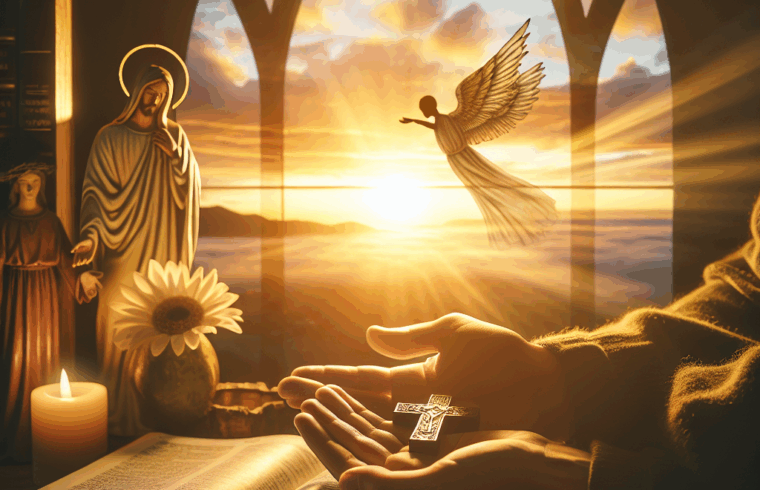==> Thank you for reading this post! Click Here If you are looking for support and Victory over PTSD.
The Role of Faith in Healing
Finding Strength in Belief
When I first encountered the overwhelming tides of PTSD, I found myself questioning everything, including my faith. But as I dug deeper, I realized that my belief system was a wellspring of strength. Faith anchored me during the storm. The moments I turned to prayer, I felt a sense of calm wash over me, a soothing balm that quieted my anxious thoughts.
In the process of healing, I learned how powerful it is to trust in something greater than myself. This journey isn’t just about me; it’s about surrendering my worries and finding solace in the promises of God. It’s amazing how faith can light up the darkest corners of our minds and give us the courage to face another day.
So if you’re feeling lost, maybe try leaning into your faith. Whether it’s through scripture, prayer, or simply talking to God, I can’t stress enough how comforting it can be to remember that you are not alone in your struggles.
The Importance of Community Support
Building a Support Network
One thing I discovered on my journey through PTSD is how vital it is to have people around you who understand. I was lucky enough to find a group of supportive friends and family who were there to listen without judgment. Just having someone to talk to about my experiences made a world of difference.
Additionally, church communities or support groups can be an incredible source of comfort. You’d be surprised how many people are going through similar struggles. Finding a safe space where you can share and be heard is essential. It’s like a breath of fresh air to know you’re not isolated in your feelings.
When we lift each other up, we not only share our burdens but also foster connections that can help heal. So don’t shy away from reaching out. You might just find that others are eager to walk this path alongside you, and trust me, it makes a difference!
Hope as a Healing Vehicle
Embracing the Power of Hope
Ah, hope! It’s such a loaded word but also full of promise. When I was deep in the trenches with PTSD, hope felt elusive, like a flickering light at the end of a dark tunnel. I wasn’t sure I could ever reach it. But over time, I realized that hope isn’t about blind optimism; it’s about the belief that change is possible.
Holding onto hope means allowing myself to dream of a healthier future. For me, that looked like celebrating small victories: even getting out of bed some days was a win worth recognizing. Each step, no matter how small, brought me closer to healing.
Encouraging yourself to hope for better days can truly fuel your journey. In times of doubt, remember that hope fuels our actions; it lifts us from despair and empowers us to seek help when we need it most. And trust me, hope is contagious—spread it wherever you can.
Scripture and Mindfulness as Tools
Integrating Faith and Practice
Incorporating scripture into my daily life was monumental. There’s something about reading the Psalms or the words of Jesus that brought peace during turbulent times. I started to see these ancient texts as more than just words on a page; they are guidance and assurance that I’m not alone.
Get Support and Help with Recovery! Visit us for more Information and Support
Alongside scripture, practicing mindfulness became a companion on my healing journey. I found that taking a moment each day to breathe, reflect, and meditate on God’s promises helped center my thoughts and emotions. It’s all about creating a habit that integrates faith into everyday living.
Whether you choose to memorize verses that uplift you or dedicate time to meditate—that combination can be a powerful remedy. It not only provides comfort but strengthens your connection to both your faith and your inner self, which are key elements in overcoming PTSD.
Taking Action on Your Healing Journey
Steps to Engage in Your Healing Process
Taking those first steps towards healing can feel monumental, but it’s essential for recovery. One major step I took was seeking professional help while integrating my faith into therapy. A therapist who understands PTSD can be invaluable. They can guide your healing in a tailored manner, rooted in your own beliefs.
Finding activities that resonate with my spirituality also played a big role. Volunteer work, participating in church activities, and serving others not only built my faith but also shifted my focus away from my own struggles. Helping others often brings joy and creates a sense of purpose.
Finally, I focused on self-care that honored my mental health while incorporating my faith, like journaling prayers or going on nature walks. Each of these steps, while seemingly small, collectively propelled me forward on my journey. So, wherever you are, just remember: action leads to healing.
Frequently Asked Questions
1. How can faith help someone with PTSD?
Faith can provide a framework for understanding suffering and offers hope during dark times, allowing individuals to find strength beyond their struggles.
2. What role does community play in healing?
A supportive community can be crucial. It allows individuals to share experiences, lean on one another, and feel less alone in their journey toward healing.
3. How do I cultivate hope when I feel hopeless?
Start small. Celebrate little victories and remember that healing takes time. Surround yourself with supportive people who can remind you of the possibilities ahead.
4. Should I involve a therapist in my healing journey?
Absolutely! Professional help can be incredibly beneficial, especially when combined with your personal faith, providing tailored strategies for managing PTSD.
5. What practices can I integrate for better mental health?
Consider integrating scripture reading, mindfulness meditation, and acts of community service into your routine. These can enhance your spiritual well-being while promoting mental health.













